Text

Source
#mood#mood atm#about writing#writing#writers on tumblr#writer things#writer#writers#I queued therefore I exist
2K notes
·
View notes
Text
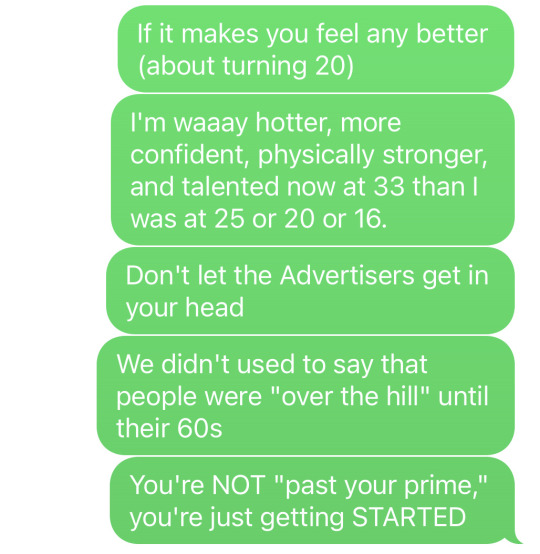
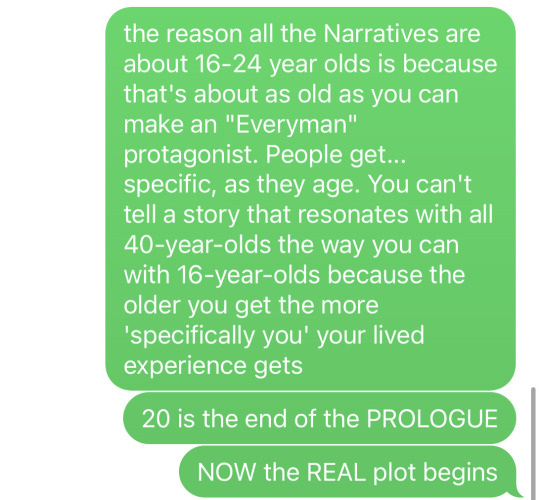
115K notes
·
View notes
Text
“This is your daily, friendly reminder to use commas instead of periods during the dialogue of your story,” she said with a smile.
554K notes
·
View notes
Text
need refs/inspo for period clothing?
here you go:
Medieval (9th-15th century):
10th century and earlier
Romance (1000-1250)
11th century
12th century
13th century
more 13th century
14th century
more 14th
15th century
and more 15th century
Gothic (1150-1550)
Renaissance (1520-1650)
16th & 17th century
16th century
more 16th
Tudors (1500-1550)
more Tudors
Elizabethan Period (1558-1603)
Jacobean Era (1603-1625)
17th century
more 17th century
and again
and even more
this won’t stop
Baroque (1600-1750)
Georgian Period (1714-1830):
18th century
more 18th century
18th century women’s fashion
18th century men’s fashion
Rococo (1720-1770)
Classicism (1770-1790)
children 18th-19th century
Regency Preiod (1811-1820)/ Empire (1800-1820s):
1790-1820s
more stuff on regency and georgian era
even more
that’s not enough regency
and more
how is there so much
early 19th century men’s wear
early 19th century women’s wear
Victorian Period (1837-1901):
Romantic Era (1820-1840s)
Civil War Era/1850-1860s
1870-1890s
more victorian
Edwardian Period (1901-1910):
1900-1910s
Belle Epoque (1880-1910s)
more edwardian/belle époque
Modern:
1910s-1920s [Fashion between the World Wars]
1920s
more roaring 20s
so much 20s
1920s hairstyles
1930s
1930-1940s
1930-1950s
1950s
more 50s
1960s
1960-1970s
1980s
lots of periods in one spot/fashion through centuries:
here, here, and here is almost everything (and properly ordered)
also here with lots of historic fashion magazines
historic fashion
costumes of antiquity
more historical clothing
history of fashion
more history of fashion
“vintage” clothing
historic costumes
children’s historical fashion/toys
details
historic wedding dresses
historic assecoires (hats, shoes…)
hats
masks
parasols
lots of embroidery/jewlery
it indeed is western/european centric, I’m sorry for that, but for other cultures I simply don’t have so many references
156K notes
·
View notes
Photo


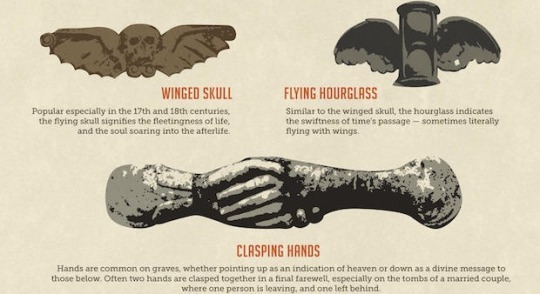
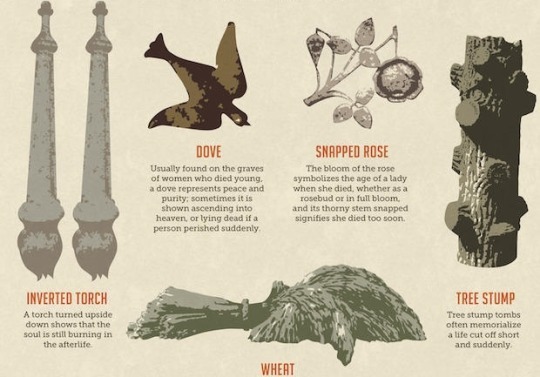

Source
58K notes
·
View notes
Text
site that you can type in the definition of a word and get the word
site for when you can only remember part of a word/its definition
site that gives you words that rhyme with a word
site that gives you synonyms and antonyms
1M notes
·
View notes
Photo

Girls pose by a jail that recalls the witch trials of 1692 in Salem, Massachusetts. Photo taken in 1945.
618K notes
·
View notes
Photo

743K notes
·
View notes
Text
I want someone to write a book where Mermaids are the women thrown off ships when the sailors got afraid because having a woman on the boat is bad luck. And as they sink to the bottom legs tied together they change slowly until they can breath, until they can use their tied up legs to swim. And they drown sailors in revenge, luring them in by singing in their husky voices still stinging from the salt water they breathed.
433K notes
·
View notes
Text
Are These Filter Words Weakening Your Story?
After putting my writing on hold for several weeks, I decided to jump back in. I expected to find all sorts of problems with my story–inconsistencies in the plot, lack of transitions, poor characterization–the works. But what began to stick out to me was something to which I’d given little thought in writing.
Filter words.
What are Filter Words?
Actually, I didn’t even know these insidious creatures had a name until I started combing the internet for info.
Filter words are those that unnecessarily filter the reader’s experience through a character’s point of view. Dark Angel’s Blog says:
“Filtering” is when you place a character between the detail you want to present and the reader. The term was started by Janet Burroway in her book On Writing.
In terms of example, you should watch out for:
To see
To hear
To think
To touch
To wonder
To realize
To watch
To look
To seem
To feel (or feel like)
Can
To decide
To sound (or sound like)
To know
I’m being honest when I say my manuscript is filled with these words, and the majority of them need to be edited out.
What do Filter Words Look Like?
Let’s imagine a character in your novel is walking down a street during peak hour.
You might, for example, write:
Sarah felt a sinking feeling as she realized she’d forgotten her purse back at the cafe across the street. She saw cars filing past, their bumpers end-to-end. She heard the impatient honk of horns and wondered how she could quickly cross the busy road before someone took off with her bag. But the traffic seemed impenetrable, and she decided to run to the intersection at the end of the block.
Eliminating the bolded words removes the filters that distances us, the readers, from this character’s experience:
Sarah’s stomach sank. Her purse—she’d forgotten it back at the cafe across the street. Cars filed past, their bumpers end-to-end. Horns honked impatiently. Could she make it across the road before someone took off with her bag? She ran past the impenetrable stream of traffic, toward the intersection at the end of the block.
Are Filter Words Ever Acceptable?
Of course, there are usually exceptions to every rule.
Just because filter words tend to be weak doesn’t mean they never have a place in our writing. Sometimes they are helpful and even necessary.
Susan Dennard of Let The Words Flow writes that we should use filter words when they are critical to the meaning of the sentence.
If there’s no better way to phrase something than to use a filter word, then it’s probably okay to do so.
Want to know more?
Read these other helpful articles on filter words and more great writing tips:
Filter Words and Distancing Point of View
The Reasons Editors reject Manuscripts
Filter Those words and Strengthen Your Writing
44K notes
·
View notes
Text
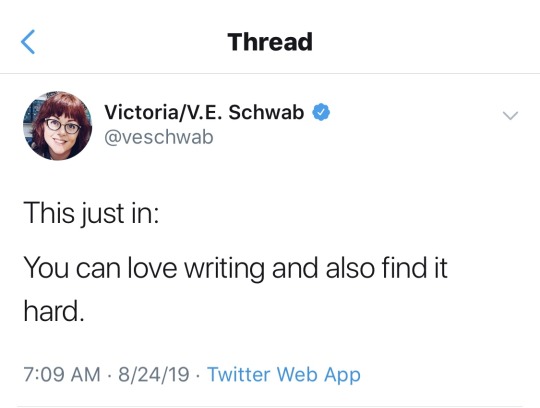
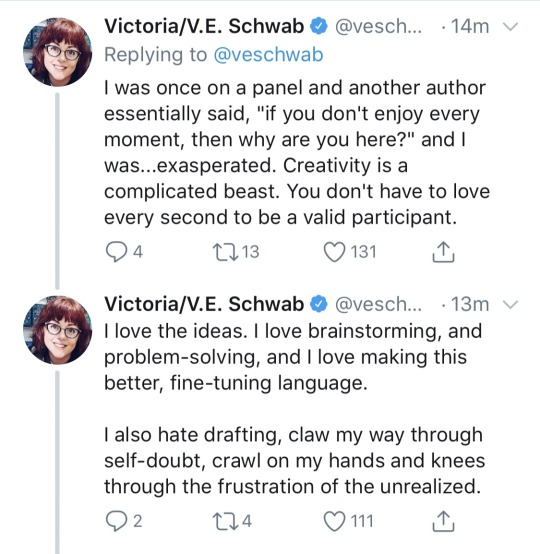

Victoria Schwab Tweets:
“This just in: you can love writing and also find it hard.
“I was once on a panel and another author essentially said, ‘if you don't enjoy every moment, then why are you here?’ and I was...exasperated. Creativity is a complicated beast. You don't have to love every second to be a valid participant.
“I love the ideas. I love brainstorming, and problem-solving, and I love making this better, fine-tuning language.
“I also hate drafting, claw my way through self-doubt, crawl on my hands and knees through the frustration of the unrealized.
“I'm not here because I love every second.
“I'm here because the parts I love are worth the rest.”
48K notes
·
View notes
Text
Stop using the word "Walk". We don't want that word to die together with "Said".
Here are a few words you can replace walk with.
AMBLE: WALK EASILY AND/OR AIMLESSLY
BOUNCE: WALK ENERGETICALLY
CAREEN: PITCH DANGEROUSLY TO ONE SIDE WHILE WALKING OR RUNNING
CLUMP: WALK HEAVILY AND/OR CLUMSILY
FALTER: WALK UNSTEADILY
FLOUNDER: WALK WITH GREAT DIFFICULTY
FOOT IT: (SLANG) DEPART OR SET OFF BY WALKING
FOOTSLOG: WALK HEAVILY AND FIRMLY, AS WHEN WEARY, OR THROUGH MUD
GIMP: LIMP; HOBBLE
HIKE: TAKE A LONG WALK, ESPECIALLY IN A PARK OR A WILDERNESS AREA
HOBBLE: WALK UNSTEADILY OR WITH DIFFICULTY; SEE ALSO LIMP
HOOF IT: (SLANG) WALK; SEE FOOT IT
LEG IT: (SLANG) SEE FOOT IT
LIMP: WALK UNSTEADILY BECAUSE OF INJURY, ESPECIALLY FAVORING ONE LEG; SEE ALSO FALTER
LUMBER: WALK SLOWLY AND HEAVILY
LURCH: WALK SLOWLY BUT WITH SUDDEN MOVEMENTS, OR FURTIVELY
MARCH: WALK RHYTHMICALLY ALONE OR IN A GROUP, ESPECIALLY ACCORDING TO A SPECIFIED PROCEDURE
MEANDER: WALK OR MOVE AIMLESSLY AND IDLY WITHOUT FIXED DIRECTION
MINCE: WALK DELICATELY
MOSEY: SEE AMBLE; ALSO, USED COLLOQUIALLY IN THE PHRASE “MOSEY ALONG”
NIP: WALK BRISKLY OR LIGHTLY; ALSO USED COLLOQUIALLY IN THE PHRASE “NIP (ON) OVER” TO REFER TO A BRIEF WALK TO A CERTAIN DESTINATION, AS IF ON AN ERRAND
PACE: WALK PRECISELY TO MARK OFF A DISTANCE, OR WALK INTENTLY OR NERVOUSLY, ESPECIALLY BACK AND FORTH
PAD: WALK WITH STEADY STEPS MAKING A SOFT DULL SOUND
PARADE: WALK OSTENTATIOUSLY, AS IF TO SHOW OFF
PERAMBULATE: SEE STROLL; TRAVEL ON FOOT, OR WALK TO INSPECT OR MEASURE A BOUNDARY
PEREGRINATE: WALK, ESPECIALLY TO TRAVEL
PLOD: WALK SLOWLY AND HEAVILY, AS IF RELUCTANT OR WEARY
POUND: WALK OR GO WITH HEAVY STEPS; MOVE ALONG WITH FORCE OR VIGOR; SEE LUMBER
POWER WALK: WALK BRISKLY FOR FITNESS
PRANCE: WALK JOYFULLY, AS IF DANCING OR SKIPPING
PROMENADE: GO ON A LEISURELY WALK, ESPECIALLY IN A PUBLIC PLACE AS A SOCIAL ACTIVITY; SEEPARADE
PROWL: WALK NOISELESSLY AND CAREFULLY IN A PREDATORY MANNER
PUSSYFOOT: WALK STEALTHILY OR WARILY
RAMBLE: WALK OR TRAVEL AIMLESSLY
ROAM: GO WITHOUT FIXED DIRECTION AND WITHOUT ANY PARTICULAR DESTINATION, OFTEN FOR PLEASURE; SEE RAMBLE
ROVE: TRAVEL CONSTANTLY OVER A RELATIVELY LENGTHY TIME PERIOD WITHOUT A FIXED DESTINATION; WANDER
SASHAY: GLIDE, MOVE, OR PROCEED EASILY OR NONCHALANTLY; SEE PARADE
SAUNTER: WALK ABOUT EASILY
SCUFF: WALK WITHOUT LIFTING ONE’S FEET
SHAMBLE: WALK OR GO AWKWARDLY; SHUFFLE; SEE SCUFF
SHUFFLE: WALK WITHOUT LIFTING THE FEET OR WITH CLUMSY STEPS AND A SHAMBLING GAIT; SEESCUFF
SKULK: MOVE IN A STEALTHY OR FURTIVE MANNER
SOMNAMBULATE: WALK IN ONE’S SLEEP
STAGGER: WALK UNSTEADILY
STALK: WALK STEALTHILY, AS IN PURSUIT
STEP: WALK, OR PLACE ONE’S FOOT OR FEET IN A NEW POSITION
STOMP: WALK HEAVILY, AS IF IN ANGER
STRIDE: WALK PURPOSEFULLY, WITH LONG STEPS
STROLL: WALK IN A LEISURELY WAY; SEE SAUNTER
STRUT: WALK WITH A STIFF, ERECT, AND APPARENTLY ARROGANT OR CONCEITED GAIT; SEE PARADE
STUMBLE: WALK CLUMSILY OR UNSTEADILY, OR TRIP
STUMP: WALK HEAVILY, AS WITH A LIMP; SEE LUMBER
SWAGGER: WALK WITH AGGRESSIVE SELF-CONFIDENCE
TIPTOE: WALK CAREFULLY ON THE TOES OR ON THE BALLS OF THE FOOT, AS IF IN STEALTH
TODDLE: MOVE WITH SHORT, UNSTEADY STEPS, AS A YOUNG CHILD; SEE SAUNTER AND STAGGER
TOTTER: WALK OR GO WITH FALTERING STEPS, AS IF FROM EXTREME WEAKNESS; SEE STAGGER(ALSO, SWAY OR BECOME UNSTABLE)
TRAIPSE: WALK LIGHTLY AND/OR AIMLESSLY
TRAMP: WALK HEAVILY OR NOISILY; SEE LUMBER AND HIKE
TRAMPLE: WALK SO AS TO CRUSH SOMETHING UNDERFOOT
TRAVERSE: WALK ACROSS OR OVER A DISTANCE
TREAD: WALK SLOWLY AND STEADILY
TRIP: WALK LIGHTLY; SEE ALSO STUMBLE
TROMP: TREAD HEAVILY, ESPECIALLY TO CRUSH UNDERFOOT; SEE LUMBER
TROOP: WALK IN UNISON, OR COLLECTIVELY
TROT: PROCEED AT A PACE FASTER THAN A WALK; SEE NIP
TRUDGE: WALK SLOWLY AND WITH HEAVY STEPS, TYPICALLY BECAUSE OF EXHAUSTION OR HARSH CONDITIONS; SEE PLOD
WADDLE: WALK CLUMSILY OR AS IF BURDENED, SWINGING THE BODY
WADE: WALK THROUGH WATER OR WITH DIFFICULTY, AS IF IMPEDED
WANDER: TO MOVE FROM PLACE TO PLACE WITHOUT A FIXED ROUTE; SEE RAMBLE
RESOURCES: (X) (X) (X) (X) (X)
30K notes
·
View notes
Text

idk if anyone will find this useful, but this is how i go about planning my stories. i mostly write fantasy, so that’s what this is most applicable to. but it could work with other genres too.
so there’s three major components to a story: the characters, the plot, and the world. creating them individually is the easy part, but they all connect and affect each other in different ways. (like you can’t have a character who loves peaches and eats them every day if they live a peasant in a region that doesn’t grow peaches, for example.)
so i created a cheat sheet to help connect all three components together.
1) the world creates the characters.
this is related to the peach example above. the characters should be a direct result of the environment they grew up in and the environment they currently live in.
2) the characters are limited by the world.
also related to the peaches. characters can’t do anything outside of what the rules of their surroundings and universe allow, such as eating peaches when they’re not available. this also applies for magic users. they can’t have unlimited magic, so keep in mind what you want out of both the characters and the world when creating magic systems.
3) the characters carry the plot.
we’ve all heard it before: “bad characters can’t carry a good plot. good characters can carry a bad plot.” but we all like a good plot anyway. try to make sure you’re not giving your characters too heavy or too light of a plot to carry.
4) the plot pushes the characters.
if nothing in the plot happens, your characters will remain static forever. if you struggle with plots, try starting with what character development you want to happen, then go from there.
5) the plot depends on the world.
you can’t overthrow the evil government if there isn’t one. think of what your world needs most and what your plot is centered around, and fit those two together.
6) the world is changed by the plot.
even if your plot is centered around something most of your world would call “insignificant”, the world will still experience some change from the plot. either the evil government will be gone, or maybe that one teacher is now way more careful about keeping an eye on the test key. either way, the world will be different from now on.
final note: usually people will be able to write one or two of the components with ease, but don’t know where to go from there. i personally can’t write plots, but thinking this way has really helped me actually make a story out of the world and characters because i looked at what i needed from what i had. i really hope this can help you too! happy writing!
tl;dr this is a cheat sheet to help anyone who struggles with writing one or two of what i consider the three major components to a story.

78K notes
·
View notes
Text
reasons to not quit writing:
your writing is a skill, not an inborn talent (unless, yeah, maybe it is). not everyone can do what you do and love
everyone says they want to write a book. everyone has what it takes to write a book. not everyone does it anyway. you be the small percentage of success you read about
your writing will always seem brickshit horrible because you wrote and read it a million times
you love this writing thingy. quitting it will be like cutting off your fingers one by one.
someone out there will want to read what you wrote.
someone out there wants to know what is on your mind.
someone out there appreciates your art. they will share it with their friends. they will share it with their loved ones. they will share it with their future self because maybe what you wrote saved them.
if you give up now, you know you will just come back to it again, whether it’s years from now, months, or next week. you love writing, that’s why you planted the seed of thought that you are going to write this book, and whether you come back to it or not, your unwritten stories will come back to you.
#let's preservere I say#and no I have not a word to my name#I'm in outlining hell#ugh#writers mood#writers life#queue queue
66K notes
·
View notes
Text
and suddenly i felt self-doubt

10K notes
·
View notes
Text

#about me#listen...#they don't get it#they hate fantasy#and#IT IS THE ONLY ONE THING I CARE ABOUT#ok?#they really hit me with: what can you learn from it?#IT'S ALLEGORY#THERE'S ALWAYS SOMETHING TO GLEAN#OTHERWISE HUMANKINDWOULDN'T GIVE A FUCK ABOUT FANTASY#it's also a very valid escape from this hellhole#there#ugh#queue queue
165K notes
·
View notes
Photo


The Witch Trial Memorial, Salem, MA
“Oh Lord, help me. I am wholly innocent of such wickedness.”
452 notes
·
View notes